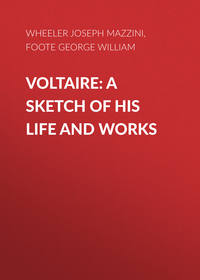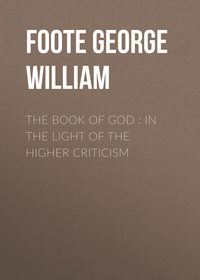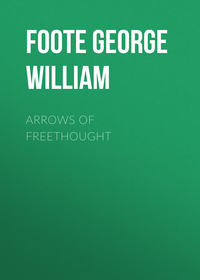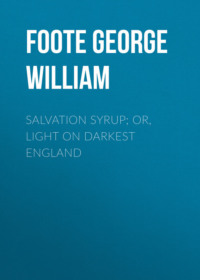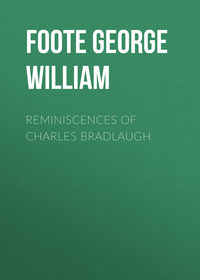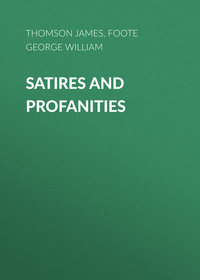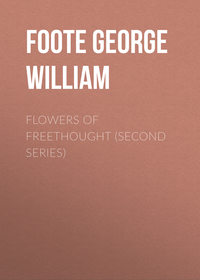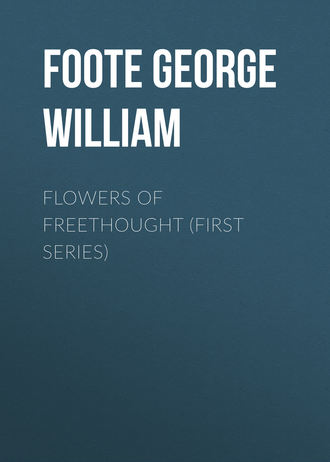 полная версия
полная версияFlowers of Freethought (First Series)
From one of his early letters we find that he contemplated a translation of the System of Nature, which is frequently quoted in the notes to Queen Mob. He couples Jehovah and Mammon together as fit for the worship of "those who delight in wickedness and slavery." In a letter to Henry Reveley he pictures God as delighted with his creation of the earth, and seeing it spin round the sun; and imagines him taking out "patents to supply all the suns in space with the same manufacture." When the poet was informed by Oilier that a certain gentleman (it was Archdeacon Hare) hoped he would humble his soul and "receive the spirit into him," Shelley replied: "if you know him personally, pray ask him from me what he means by receiving the spirit into me; and (if really it is any good) how one is to get at it." He goes on to say: "I was immeasurably amused by the quotation from Schlegel about the way in which the popular faith is destroyed – first the Devil, then the Holy Ghost, then God the Father. I had written a Lucianic essay to prove the same thing." In the very year of his death, writing to John Gisborne, he girds at the popular faith in God, and with reference to one of its most abhorrent doctrines he exclaims – "As if, after sixty years' suffering here, we were to be roasted alive for sixty million more in hell, or charitably annihilated by a coup de grâce of the bungler who brought us into existence at first." – A dozen other quotations from Shelley's letters might be given, all to pretty much the same effect, but the foregoing must suffice.
A thorough analysis of Shelley's poetry, showing the essential Atheism which runs through it from beginning to end, would require more space than we have at our command. We shall therefore simply point out, by means of instances, how indignantly or contemptuously he always refers to religion as the great despot and impostor of mankind.
The Revolt of Islam stigmatises "Faith" as "an obscene worm." The sonnet on the Fall of Bonaparte concludes with a reference to "Bloody Faith, the foulest birth of time." Shelley frequently conceives Faith as serpentine and disgusting. In Rosalind and Helen he writes —
Grey Power was seatedSafely on her ancestral throne;And Faith, the Python, undefeated,Even to its blood-stained steps dragged onHer foul and wounded train.In the great and splendid Ode to Liberty the image undergoes a Miltonic sublimation.
Like one fierce cloud over a waste of wavesHung tyranny; beneath, sat deifiedThe sister-pest, congregator of slaves.Invariably does the poet class religion and oppression together – "Religion veils her eyes: Oppression shrinks aghast." – "Destruction's sceptred slaves, and Folly's mitred brood." – "And laughter fills the Fane, and curses shake the Throne."
Mr. Herbert Spencer writes with learning and eloquence about the Power of the Universe and the Unknowable. Shelley pricked this bubble of speculation in the following passage:
What is that Power?Some moonstruck sophist stoodWatching the shade from his own soul upthrownFill Heaven and darken Earth, and in such moodThe Form he saw and worshipped was his own,His likeness in the world's vast mirror shown.In one verse of the Ode to Liberty the poet exclaims:
O that the free would stamp the impious nameOf – into the dust or write it there.What is the omitted word? Mr. Swinburne says the only possible word is – God. We agree with him. Anything else would be a ridiculous anti-climax, and quite inconsistent with the powerful description of —
This foul gordian word,Which, weak itself as stubble, yet can bindInto a mass, irrefragably firm,The axes and the rods that awe mankind."Pope" and "Christ" are alike impossible. With respect to "mankind" they are but local designations. The word must be universal. It is God.
The glorious speech of the Spirit of the Hour, which terminates the third Act of Prometheus Unbound– that superb drama of emancipate Humanity – lumps together "Thrones, altars, judgment seats, and prisons," as parts of one gigantic system of spiritual and temporal misrule. Man, when redeemed from falsehood and evil, rejects his books "of reasoned wrong, glozed on by ignorance"; and the veil is torn aside from all "believed and hoped." And what is the result? Let the Spirit of the Hour answer.
The loathsome mask has fallen, the man remainsSceptreless, free, uncircumscribed, but manEqual, unclassed, tribeless, and nationless,Exempt from awe, worship, degree, the kingOver himself; just, gentle, wise; but manPassionless? no, yet free from guilt or pain,Which were, for his will made or suffered them;Nor yet exempt, though ruling them like slaves,From chance, and death, and mutability,The clogs of that which else might oversoarThe loftiest star of unascended heaven,Pinnacled dim in the intense inane.What a triumphant flight! The poet springs from earth and is speedily away beyond sight – almost beyond conception – like an elemental thing. But his starting-point is definite enough. Man is exempt from awe and worship; from spiritual as well as political and social slavery; king over himself, ruling the anarchy of his own passions. And the same idea is sung by Demogorgon at the close of the fifth Act. The "Earth-born's spell yawns for heaven's despotism," and "Conquest is dragged captive through the deep."
Love, from its awful throne of patient powerIn the wise heart, from the last giddy hourOf dread endurance, from the slippery steep,And narrow verge of crag-like agony, springsAnd folds over the world its healing wings.Gentleness, Virtue, Wisdom, and endurance,These are the seals of that most firm assuranceWhich bars the pit over Destruction's strength;And if, with infirm hand, Eternity,Mother of many acts and hours, should freeThe serpent that would clasp her with his length,These are the spells by which to re-assumeAn empire o'er the disentangled doom.To suffer woes which Hope thinks infinite;To forgive wrongs darker than death or night;To defy Power, which seems omnipotent;To love, and bear; to hope till Hope createsFrom its own wreck the thing it contemplates;Neither to change, nor falter, nor repent;This, like thy glory, Titan! is to beGood, great and joyous, beautiful and free;This is alone Life, Joy, Empire, and Victory!This is the Atheism of Shelley. Man is to conquer, by love and hope and thought and endurance, his birthright of happiness and dignity. Humanity is to take the place of God.
It has been argued that if Shelley had lived he would have repented the "indiscretions of his youth," and gravitated towards a more "respectable" philosophy. Well, it is easy to prophesy; and just as easy, and no less effectual, to meet the prophet with a flat contradiction. "Might have been" is no better than "might not have been." Was it not declared that Charles Bradlaugh would have become a Christian if he had lived long enough? Was not the same asserted of John Stuart Mill? One was nearly sixty, the other nearly seventy; and we have to wonder what is the real age of intellectual maturity. Only a few weeks before his death, Shelley wrote of Christianity that "no man of sense could think it true." That was his deliberate and final judgment. Had he lived long enough to lose his sense; had he fallen a victim to some nervous malady, or softening of the brain; had he lingered on to a more than ripe (a rotten) old age, in which senility may unsay the virile words of manhood; it is conceivable that Shelley might have become a devotee of the faith he had despised. But none of these things did happen. What Shelley was is the only object of sane discussion. And what he was we know – an Atheist, a lover of Humanity.
LONG FACES
Every one who has turned over old volumes of sermons, adorned with the authors' portraits, must have been struck with the length of their faces. They seem to say – parodying the famous line of Dante – "Abandon jokes all ye who enter here." Those men preached a solemnly absurd creed, and they looked absurdly solemn. Their faces seemed as devoid of merriment as the faces of jackasses, and the heads above them were often as stupid. Justice forbid that I should run down a Hooker, a Barrow, a Taylor, or a South. They were men of genius, and all genius is of the blood royal. I read their writings with pleasure and profit, which is more than nine-tenths of the clergy can say with any approach to honesty. But a single swallow does not make a summer, and a few men of genius do not elevate a profession. I am perfectly convinced that the great bulk of the preaching fraternity have cultivated a solemn aspect – not perhaps deliberately, but at least instinctively – in order to impose on the ignorant and credulous multitude. The very tone of voice in which they pray, give out hymns, and preach, is artificial; in keeping with their artificial ideas and artificial sentiments; which, if they were expressed in natural tones, would excite universal contempt and derision.
Now this solemnity is the best trick in the priest's game. Gravity is always mistaken by the multitude for wisdom. A round-faced merry fellow shall make a bright, sensible speech, and he will be voted frivolous; but a long-faced, saturnine fellow shall utter a string of dull platitudes, and he will be voted a Solon. This is well known to the clergy, who have developed a perfect art of dullness. They talk an infinite deal of nothing, use a multitude of solemn words to hide an absurdity or no meaning at all, and utter the inherited shibboleths of their craft like the august oracles of a recent revelation.
Concede them the advantage of solemnity, or reverence, or whatever else it is called, and you give them the victory at the beginning of the battle. If you pull a long face over their nonsense, the spectators, after all your arguments, will say, "There must be something in it, though, for see how serious he is." Whereas a light jest and a merry smile will show you are heart-free, and beyond the range of clerical artillery.
I do not pretend, however, that the efforts of Free-thought critics should have no background of seriousness. Wit without reason, says Heine, is but a sneeze of the intelligence. But has not wit ever been the keenest weapon of the great emancipators of the human mind? Not the mere plaything of an idle mind in an idle hour, but the coruscating blade to pierce the weak places of folly and imposture. Aristophanes, Lucian, Rabelais, Erasmus, and Voltaire – to take a few great instances – were all serious in aim and intention. They valued truth, goodness, and beauty, as much as the dreariest preachers. But they felt, because of their temperament, that while the dry light of the intellect is suited to the study of science, it is inadequate in the realm of political, social, and religious debate, where everything is steeped in feeling, and hopes and fears strive together, and imagination kindles the very senses into keener play.
After all, perhaps, this word temperament is a solution in itself. When Bishop South was taken to task by a brother bishop for his witticisms, he replied, "Do you mean to say that if God had given you any wit you would not have used it?" Thus is wisdom justified of her children.
My friendly though severe critic, Dr. Coit, who recently discoursed at South-place Institute (or is it Chapel?) on the National Secular Society in general and myself in particular, could hardly deny that Voltaire was a master of wit, sarcasm, irony, and ridicule. Well, now, let us see what some serious writers have said of this nimble spirit. Robert Browning, in The Two Poets of Croisic thus salutes him:
Ay, sharpest shrewdest steel that ever stabbedTo death Imposture through the armor-joints!Carlyle says "He gave the death-stab to modern superstition," and "it was a most weighty service." Buckle says he "used ridicule, not as the test of truth, but as the scourge of folly," and thus "produced more effect than the gravest arguments could have done." "Nor can any one since the days of Luther be named," says Brougham, "to whom the spirit of free inquiry, nay, the emancipation of the human mind from spiritual tyranny, owes a more lasting debt of gratitude."
There is a story of the manuscript of Harrington's Oceana being filched and given to Cromwell, and the sagacious "usurper" returned it saying, "My government is not to be overturned with paper pellets." But the ironical pamphlet, Killing no Murder, produced a different effect. Nor did the royal and imperial despots, and their priestly abettors, in the eighteenth century, dread the solemn lovers of freedom. But the winged pen of Voltaire was a different matter. "Bigots and tyrants," says Macaulay, "who had never been moved by the wailing and cursing of millions, turned pale at his name."
If Dr. Coit imagines that Voltaire has lost his influence in France, I venture to say he is mistaken. The hand of Voltaire is on Renan, and on dozens of living soldiers in the French army of progress. And what man of letters in England – a country abounding in "the oxen of the gods," strong, slow, and stupid – is free from his influence? Carlyle's early essay on Voltaire is a mixture of hatred and admiration. But read the Life of Frederick, and see how the French snake fascinates the Scotch Puritan, until at last he flings every reservation aside, and hails with glowing panegyric the Savior of Calas.
Let me refer Dr. Coit to the delightful preface of a delightful book – Leland's introduction to his fine translation of Heine's Reisebilder. "Woe to those who are standing near," says Leland, "when a humorist of this stamp is turned loose upon the world. He knows nothing of your old laws, – like an Azrael-Napoleon he advances conscienceless, feeling nothing but an overpowering impulse, as of some higher power which bids him strike and spare not." But, after all, the main cause of progress is agitation, and though the agitation may be "eminently disagreeable to many, even friends, who are brought within its immediate action, it will be eminently beneficial in the end."
Yes, the hard-bound human mind, like the hardbound soil, has to be ploughed up. Let it shriek as it will, the work must be done, or the light and air will never penetrate, and an ocean of seeds will lie barren on the surface.
Dr. Coit need not fear that ridicule will excite apprehensions about the multiplication table. Ridicule has a fine scent for its proper prey. It must detect the ridiculous before it couches and springs. Truth, honor, consistency, disinterestedness, are invulnerable. What ridicule can kill deserves to die.
Mr. George Meredith writes of "that first-born of common-sense, the vigilant Comic, which is the genius of thoughtful laughter." Folly is the natural prey of this hunter, and Folly is found in the churches as well as in the streets. Some men, however, are non-laughers by birthright, and as men are apt to make a virtue of their deficiencies, it is not surprising if, as Mr. Meredith observes, the "laughter-hater soon learns to dignify this dislike as an objection in morality."
Persons who have read the Freethinker from the first do not need to be assured of the earnest spirit of its conductors. They fight no less sternly for the iridescent jewels in their swords. But Dr. Coit appears to object to fighting altogether. He seems to bid us rest content with what we have won. That is, he bids us leave superstition, with all its brood of lies and wrongs, in possession of the schools, the universities, the churches, the hospitals, the workhouses, and every other institution. He bids us leave it with its large grasp on the private and public life of the community, and go on with our constructive work in face of all this overwhelming frustration. No doubt he means well, but we are not foolish enough to take his advice. We tell Dr. Coit that he does not understand the obstructive power of theology, and that he is thus unable to appreciate the work of the National Secular Society.
But let us return to the point of ridicule, and the point of "blasphemy." Dr. Coit found two "lessons for the day" in my Philosophy of Secularism, and he spoke of my Shadow of the Sword as "a noble plea for peace." But he complained of my exposing the absurdities and immoralities of the Bible – a book which is thrust into the hands of little children in our public schools. He also complained of my dragging to light the Crimes of Christianity. But his anger was most excited by one of my "Bible Romances" —A Virgin Mother. Some fastidious persons even object to the title, thus showing their abysmal ignorance of Christian literature. The phrase is common in Catholic books of devotion, like the Mother of God. It occurs in Milton's Ode on the Nativity and in Paradise Lost. I have marked it a dozen times in Professor Palgrave's collection of Sacred Songs. But Dr. Coit objects to my comparison of the Holy Ghost's "overshadowing" of the Virgin Mary with the divine impregnations of earthly women by the gods of the Greek pantheon. He regards the one as a "mystery" and the others as vulgar amours. But this depends on your point of view. Lord Bacon found a mine of hidden wisdom in some of these "amours," and Mr. Morris makes beautiful poetry of the loves of Zeus and Danae, which is more than any one has ever succeeded in doing with the relations between the Holy Ghost and Mary. I admit, however, that taste is not disputable; and I refer Dr. Coit to the passage of my Virgin Mother in which I cite Justin Martyr as appealing to the Pagan not to mock at the Incarnation, on the express ground that they also taught the same doctrine in their stories-of the demi-gods who were born of women after the embraces of deities. Surely, then, it is idle to complain of my disrespect of this Christian dogma. Nor is it just to say that my criticism of it cannot be read to a mixed audience. That is the fault of the doctrine. So far as my words go, there is not a syllable to shock any but a prurient modesty.
With respect to Dr. Coit's plea for bringing the kindness of social intercourse into the war of ideas, I have this to say – It is impossible. Timid persons have always sighed for this policy, but when the fight began they have found themselves "between the fell incensed points of mighty opposites." Religion should be treated as freely as other subjects. That is all I claim, and I will not be satisfied with less. I cannot consent to relinquish any weapon that is legitimate in other warfare. Nor for the sake of temporary feeling will I be false to the permanent interests of my species. I will laugh at folly, scorn hypocrisy, expose falsehood, and bathe my sword in the heart's blood of imposture. But I will not descend to personalities. I do not war with persons, but with principles.
My object is to destroy the Christian superstition and prepare the way for a more rational and humane condition of society. I shall adapt myself, as well as I can, to the shifting conditions of the struggle. My aim is to succeed. My policy, therefore, will never be determined by a personal preference. I shall follow the path that promises victory. But I do not, and will not, dictate to others. Within the scope of our principles there is room for many policies. Let each do his best, according to his light and opportunity. Let Dr. Coit, too, go his way as I go mine. We travel by different routes, but perhaps we shall meet at the goal.
OUR FATHER
God's in his heaven,All's right with the world.– R. Browning, Pippa Passes.The Apostles' Creed, with which the Apostles never had anything to do, begins with the words "I believe in God the Father Almighty." The last word, "Almighty," is an adjective which we owe to the metaphysical genius of Christian theologians; and the first words, "I believe," are the customary shibboleth of the priests of every religion. For the rest, this extract from the Creed is taken from the Lord's Prayer, which itself is a brief selection from common Jewish prayers before the days of Jesus. According to the evangelists – whoever they were – Jesus taught his disciples to pray to "Our Father which art in Heaven for a number of things which no one ever obtained by that process. Nevertheless the petition is offered up, generation after generation, by millions of Christians, whose hands are first folded in the gesture of prayer on their mothers' knees, and whose lips are taught at the same time a form of words that clings to them for life.
"Our Father!" The words are pretty and touching. When the child hears them he thinks of some one like his own father, but immensely bigger and more powerful; and as the child is taught that all the necessaries and comforts of life he enjoys, at the expense of his parents' labor and loving care, are really gifts from the Father behind the scenes, it is no wonder that this mysterious being becomes the object of gratitude and affection.
Which art in Heaven! Up there in the region of dreams, beyond the sailing clouds, far away through the deep blue, where imagination builds its fairy palace of delight, and God sits on his golden throne, and swift, bright angels speed forth to execute his commands. Tell a child anything you please about that land of fancy and you will be believed, especially if the tale comes from beloved lips, or from lips that bear the glamor of authority. And what the child is to the adult, early or savage man is to the civilisee. To the African negroes the highest god is the Sky; the great deity Dyu of our Aryan ancestors was the Sky; the Greek Zeue and the Latin Jupiter were both the Heaven-Father; and we still say "Heaven forgive me!" or "Fear the vengeance of Heaven!"
This Heaven, however, is no longer credible to any one with a tincture of science. Hard as the truth to a child or a savage, the sky is not a reality, but an optical illusion. For forty or forty-five miles from the earth's surface there is a belt of atmosphere, growing rarer and rarer as it approaches the infinite ocean of æther. Gone for ever is the old delusion of a solid Heaven overhead, with windows in it, through which God and the angels looked down upon the earth and its inhabitants. And what site is there for Heaven out in the cold blackness of space?
That Heaven is gone, and where is Our Father? Science shows us a world of absolute order, in which what we call the laws of nature – the observed sequence and recurrence of phenomena – are never broken. The world was not fashioned for man's dwelling, nor is it maintained for his benefit. Towards the poles he freezes, towards the equator he burns. The rain nourishes his crops or rots them, without asking his pleasure; the sea bears him or drowns him, with equal unconcern; the lightning slays him or spares him, whether good, bad or indifferent, as he happens to be in or out of the line of its dazzling flight; famine pinches his! cheeks if he cannot procure food; the pestilence seizes upon his nerves and blood unless he learns the antidote to its ravages. He stands amidst the play of terrific forces, and only preserves himself by vigilance, patience, courage and industry. If he falls the enemy is upon him, and the doom of the vanquished is death. Nature shows him no mercy. His mistakes are as fatal as his crimes.
"God" has been in his "Heaven" for eternity, but all is not right with the world. Man is always endeavoring to improve it, but what assistance comes from above? A Father in Heaven would be a glorious fact. But who can believe it? "Our Father" is utterly careless of his children. The celestial Rousseau sends all his offspring to the Foundling.
The late hard weather has thrown thousands of honest men out of employment, and increased the death-rate alarmingly. Where is the wisdom of this? Where is the goodness? The worst of men would alter it if they could. But God, they say, can do it, and he does not. Yet they still look up and say "Our Father." And the Father looks down with a face as blenchless as the Sphinx's, gazing forthright across the desert sands.
What father would permit in his family the gross disparities we see in human life? One gorges and another starves; one is bloated and another is death's counterfeit; one is dressed in three-piled velvet and another goes in looped and windowed rags; one is idle and another slaves; one is sated with pleasure and another is numbed with pain; one lolls in a palace and another shivers in a hovel. What human father would not be ashamed to treat his children with such infamous partiality?


